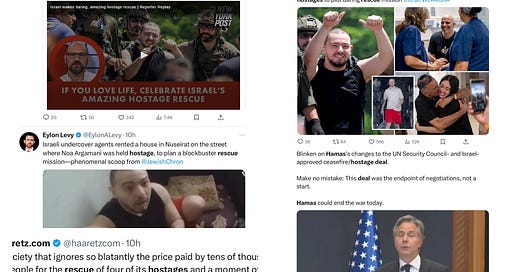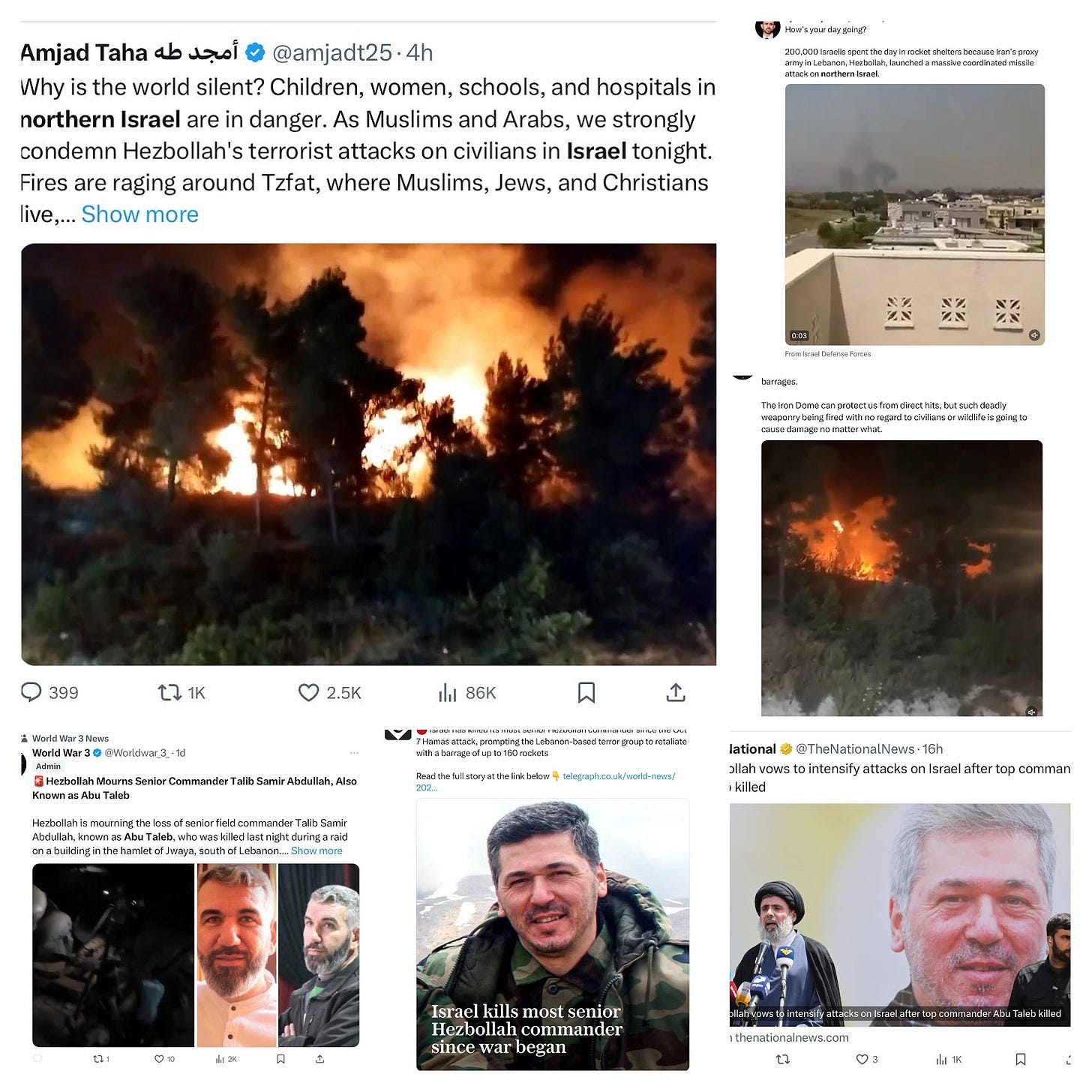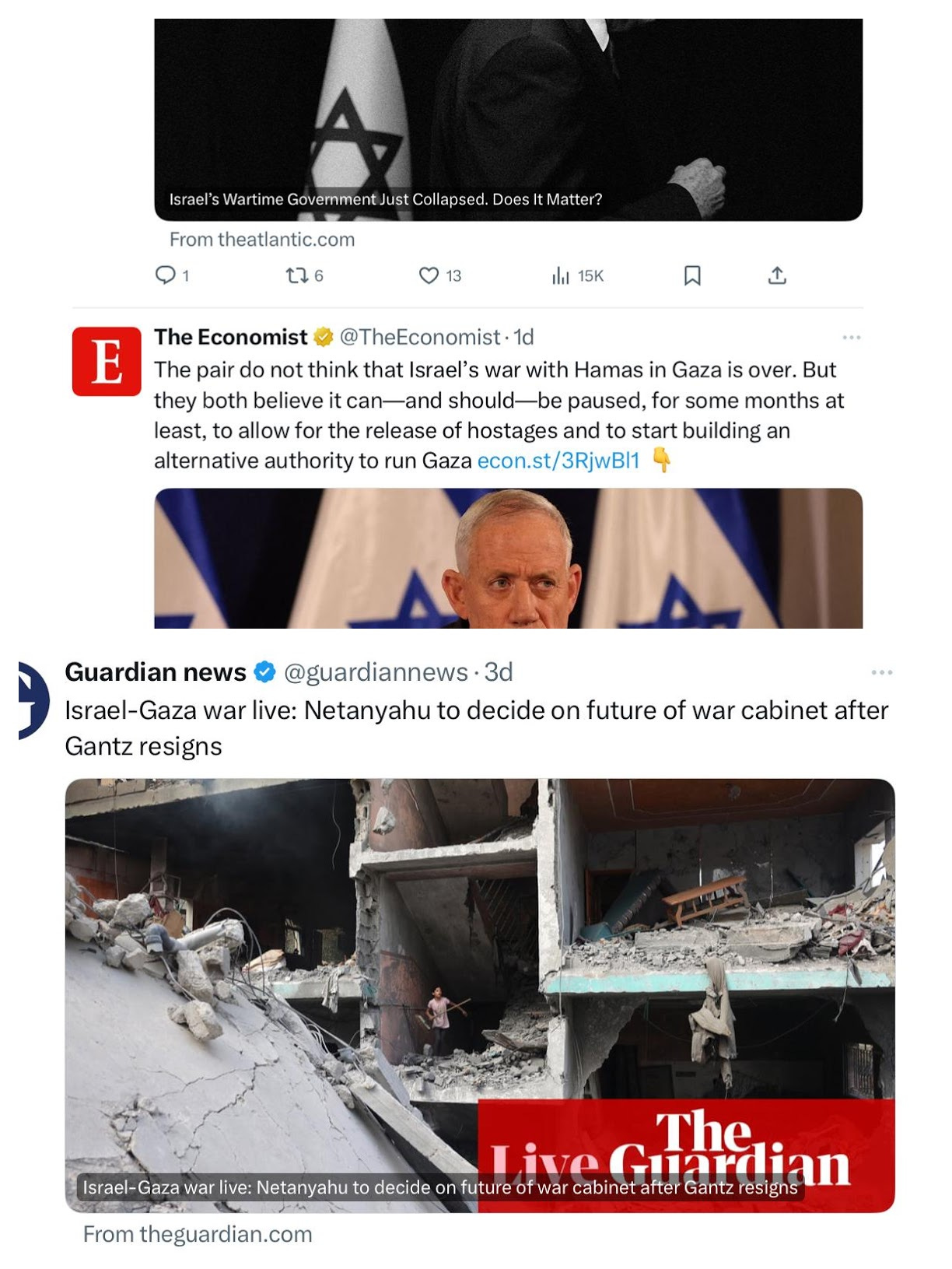Israel at War - Day 252
1. Four Hostages Rescued from Hamas Captivity in Elaborate Military Operation
Last Saturday, Israeli special forces rescued four Israeli hostages kidnapped from the Nova music festival on October 7, and held by Hamas for eight months. The media reported that the rescue operation was planned for several weeks, and informed by intel extracted in interrogations of Hamas fighters held by the IDF. Undercover intelligence officers, disguised as Gazans gathered intel as well prior to the operation. The four hostages, Noa Argamani, Almog Meir Jan, Andrey Kozlov and Shlomi Ziv, were held in two apartments only 200 meters apart in Rafah.
The rescue force came under heavy fire during the operation and killed 30 Hamas armed fighters. One Israeli IDF officer was killed during the operation. According to Hamas, 274 civilians were killed and 400 more were injured during the operation.
The news of the successful rescue operation was received with great joy and excitement in Israel, as people watched live footage as the hostages arrived at a hospital in Tel Aviv, where they reunited with their families. PM Netanyahu came to the hospital to welcome them. `He later was criticized for showing up to take credit for the successful rescue operation, but had failed to contact the families of hostages killed in Hamas captivity and bereaved families of both the October 7th massacre and the Iron Swords war in Gaza.
The physician who treated the rescued hostages said that they were subjected to daily physical and mental violence. Noa Argamani, whose video of being kidnapped to Gaza went viral, said in a media interview that she was able to receive some news from Israel and was saddened to learn that part of the Israeli public was against ending the fighting in Gaza in exchange for the release of the hostages. Upon her release, Noa reunited with her terminally ill mother who has repeatedly said in media interviews that she hopes to see Noa before she dies.
Local and international media outlets praised the IDF for their successful operation, while others were critical of the heavy toll it took on the lives of uninvolved civilians in Gaza. Senior security officials said that the best way to release all hostages is through a ceasefire deal with Hamas. Hostage families and their supporters rallied on Saturday night in numerous locations around the country, calling for a ceasefire/hostage deal.
2. US Pushing Israel To Reach a Deal With Hamas
President Biden and his administration are pushing Israel and Hamas to reach an agreement that will put an end to the war in Gaza, and release the rest of the 120 Israeli hostages still in captivity. It is believed that a few dozen of them are still alive.
Secretary of State, Anthony Blinked traveled again to the Middle East, as part of the efforts to put pressure on both Israel, and Hamas to agree to the final deal that will end the war. Israel partly agreed to a deal that will include the end of the war, although there are key players in PM Netanyahu’s government that strongly oppose such a deal, even if the price is the lives of the hostages still believed to be alive. Those are the coalition parties that are lead by Itamar Ben Gvir and Betzalel Smotritch.
On the other hand, Hamas is hardening its position and now it seems that it has put up another obstacle. It was reported that Hamas demands that China and Russia will guarantee the deal between Hamas and Israel. Secretary Blinken, who met with PM Netanyahu in Jerusalem, traveled to Qatar to put pressure on Hamas.
Meanwhile the UN Security Council voted to put an end to the war in Gaza. If this decision will move forward to the UN assembly, and if the US will not veto a decision to end the war, this may cause problems for Israel. Right now PM Netanyahu continues to promise to continue the war until a total victory is achieved.
3. Israel Killed a Senior Hizbollah Operator and Hizbollah Retaliated Aggresively With More Than 200 Rockets and Missiles Fired at Israeli Targets
Israeli military forces were able to kill one of the most important Hizbollah generals, who was in charge of the organization’s operations against Israel. Sami Abdallah, also known as Abu Taleb, was killed with three other Hizbollah operators. He is the most important and senior Hizbollah military operator that Israel has managed to kill. The Lebanese based Islamic organization, Hizbollah, retaliated by launching an intense missile and rocket attack on northern Israel. In this attack the organization widened the radius of communities that were targeted. Some of the new targets were towns that host some of the displaced communities, which were evacuated shortly after the October 7th attack in the south.
Hizbollah promised to intensify its attacks on Israel. The heavy shelling started fires all over the northern part of Israel, due to the hot weather and dry fields.
Israel has not yet decided how to deal with the deteriorating security situation in the north with Hizbollah, and what should be the best strategy to reach a deal with Hizbollah and Lebanon that will hold. The aim is to keep Hizbollah forces from getting close to the border with Israel and to enable Israel to allow its’ citizens to get back to their homes and communities which were evacuated eight months ago. Some believe that if and when there is a cease fire with Hamas in Gaza, this will have an effect on the conflict with Hizbollah and it will enable Israel to reach a cease fire with them.
The US is extremely worried that Israel will engage in a regional war if the situation continues to deteriorate.
4. War Minister Benny Gantz Resigns From Emergency Government
Benny Gantz, Chair of the centrist National Unity party announced earlier this week that he was leaving the emergency government, having joined it following the Hamas attack on Israel on October 7th and the war in Gaza. Cabinet minister Eisenkot, also of the National Unity party, who lost his son during the Iron Sword war in Gaza, also left the emergency government.
In his statement, Gantz criticized PM Netanyahu for preventing Israel from reaching a “real victory” and for acting out of narrow political interests. Gantz vowed to back any ceasefire/hostage deal and called for national elections.
According to analysts, Gantz’ resignation does not immediately threaten PM Netanyahu’s political prowess, as his coalition still maintains a 64-seat majority in the Knesset. However, Netanyahu is now even more reliant on his far-right coalition partners, the Religious Zionism and Jewish Power parties, who openly oppose any ceasefire/hostage deal and push for the contiuation of the war in Gaza, until “complete victory”.
5. Israel Marks the Holiday of Shavuot Amidst War
Earlier this week, eight months since October 7th, Israelis marked the festival of Shavuot amidst the war in Gaza and barrages of Hizbollah rockets from Lebanon. Shavuot marks the begining of the harvest season, and is traditionally celebrated in Kibbutzim and other agricultural communities with a celebration of the early season fruits, symbolizing the tradition of offerings of first fruits of the season, Bikkurim, in Hebrew, in the days of the Temple. Shavuot also celebrates the giving of the Torah to Moses at Mount Sinai.
However, this year, with tens of thousands of Kibbutz members from the south and north of Israel evacuated from their homes, and with dozens of them still held captive by Hamas, the holiday celebrations were more somber. Evacuees from Kibbutzim in the north and south marked Shavuot in Kibbutzim farther from the southern and northern borders. The traditional ‘Bikkurim’ ceremony also included a call for the release of the hostages.
To our readers: Please note that we embed links to further details/articles behind the summaries for each item. You can see the links by their blue color and, if you are interested in further details, you can click on the link to access the relevant article/s.








